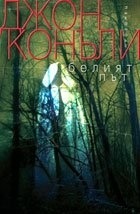Take a photo of a barcode or cover
[Read July 2018; Reviewed Oct 2022]
In my copy of The White Road [Emily Bester Books, 2015] John Connolly states in his Author’s Introduction that this entry is “the closest thing to a sequel in the [Charlie] Parker series.” He also writes: “You can still read this book, but you'll probably get more out of it if you read The Killing Kind first.” Both are true. The previous novel is a complete story. Even in fictional worlds, apparently, life continues after you turn your attention elsewhere. Things are no longer as tidy as we left them and forgone conclusions are now in doubt, all without invalidating any part of The Killing Kind. Connolly also keeps The White Road from being a true sequel by making the characters and situations from the previous work the “B” story. The main story involves Charlie Parker temporarily leaving behind in Maine Rachel, his pregnant partner, to help a friend in South Carolina.
Before Parker becomes directly involved, the tone of the book is established in a prologue split between the hanging and burning of a black man in 1964 and the present day (2003), where Parker’s friends Louis and Angel coincidentally chose this exact time to take revenge on three of the most vicious participants in the hanging. Of course, in a hardboiled series laced with supernatural elements, nothing is coincidental. The case that beckons Parker southward also involves a black man, in this case accused (and automatically presumed guilty) of killing the daughter of an extremely rich local family. Only his lawyer, Parker’s friend, believes him innocent. Even then, it takes the firebombing of the lawyer’s home for Parker to agree to come help him.
As often happens with books like this the two stories come together near the end, although they are not necessarily connected. One thing that does connect them, though, is that while the guilty do pay, there are many others who also pay, in some cases a high price, for that to come to pass. Or as the author states in that same introduction referenced above: “I'm always surprised when a reader cites The White Road as a particular favorite among my novels . . . it's dark and pretty relentless.” Again, I agree with Connolly. Not just with his assessment of his own work but also in questioning its popularity. I hesitate to say that it is my least favorite in the series so far; it implies that I did not like it. Least favorite does not mean dislike. I enjoy Connolly’s prose too much and I love each time he expands and explores this world he’s created. I seriously doubt he could produce a book I’d not like. At least as long it involves “The Charlie Parker Universe.”
And to be clear, the unrelenting darkness is not the reason for my slight disconnect. The novel felt not as tight, its focus more diffused. So, yes, I liked the previous three novels better. But I can still recommend The White Road without hesitation. Just be warned, despite some supernatural elements, the evil here is very real. And very unsettling, particularly as we can currently see it stepping boldly out of the shadows in the real world. In our world. At least in The White Road you count on evil eventually being defeated.
In my copy of The White Road [Emily Bester Books, 2015] John Connolly states in his Author’s Introduction that this entry is “the closest thing to a sequel in the [Charlie] Parker series.” He also writes: “You can still read this book, but you'll probably get more out of it if you read The Killing Kind first.” Both are true. The previous novel is a complete story. Even in fictional worlds, apparently, life continues after you turn your attention elsewhere. Things are no longer as tidy as we left them and forgone conclusions are now in doubt, all without invalidating any part of The Killing Kind. Connolly also keeps The White Road from being a true sequel by making the characters and situations from the previous work the “B” story. The main story involves Charlie Parker temporarily leaving behind in Maine Rachel, his pregnant partner, to help a friend in South Carolina.
Before Parker becomes directly involved, the tone of the book is established in a prologue split between the hanging and burning of a black man in 1964 and the present day (2003), where Parker’s friends Louis and Angel coincidentally chose this exact time to take revenge on three of the most vicious participants in the hanging. Of course, in a hardboiled series laced with supernatural elements, nothing is coincidental. The case that beckons Parker southward also involves a black man, in this case accused (and automatically presumed guilty) of killing the daughter of an extremely rich local family. Only his lawyer, Parker’s friend, believes him innocent. Even then, it takes the firebombing of the lawyer’s home for Parker to agree to come help him.
As often happens with books like this the two stories come together near the end, although they are not necessarily connected. One thing that does connect them, though, is that while the guilty do pay, there are many others who also pay, in some cases a high price, for that to come to pass. Or as the author states in that same introduction referenced above: “I'm always surprised when a reader cites The White Road as a particular favorite among my novels . . . it's dark and pretty relentless.” Again, I agree with Connolly. Not just with his assessment of his own work but also in questioning its popularity. I hesitate to say that it is my least favorite in the series so far; it implies that I did not like it. Least favorite does not mean dislike. I enjoy Connolly’s prose too much and I love each time he expands and explores this world he’s created. I seriously doubt he could produce a book I’d not like. At least as long it involves “The Charlie Parker Universe.”
And to be clear, the unrelenting darkness is not the reason for my slight disconnect. The novel felt not as tight, its focus more diffused. So, yes, I liked the previous three novels better. But I can still recommend The White Road without hesitation. Just be warned, despite some supernatural elements, the evil here is very real. And very unsettling, particularly as we can currently see it stepping boldly out of the shadows in the real world. In our world. At least in The White Road you count on evil eventually being defeated.
Very intense and very good. Definitely more graphic and more creepy than some people will like, but I enjoyed the suspense and the far-reaching plot lines that included Southern history, racism, South Carolina and Gullah traditions and so much more. Definitely not for the faint of heart though.
Probably the darkest and most gruesome of the Charlie Parker(which is saying a lot) with John Connolly looking into the deep-rooted racism/slavery in the south.
The Catch-22 of a book being so good you never want it to end, but it’s so good you can’t put it down and finish it in 3 sittings.
So far I've found this to be the best in the series, apart from the first book.
challenging
dark
emotional
funny
hopeful
mysterious
sad
tense
dark
emotional
mysterious
tense
medium-paced
Plot or Character Driven:
Plot
Strong character development:
Yes
Loveable characters:
Complicated
Diverse cast of characters:
Yes
Flaws of characters a main focus:
Yes
Not as scary as The Killing Kind, but still pretty disturbing. I don't know how John Connolly can sleep at night, with all these horrific ideas floating around in his head (for that matter, I have no idea how I can sleep after reading his books). I honestly have things floating around in my brain that I never needed or wanted there, and a whole new host of monsters (in the shape of real people) to be scared of when the lights go out. But, of course, I'll keep reading, to see how things turn out for Charlie Parker.
Not as gripping as the others, even tho I really enjoyed the Angel/Louie backstory.
The supernatural parts feel forced and are not as haunting as in the previous novels.
I also intensely disliked Paul Birchard's narration, it's flat and boring, and his voices all sound the same.
The supernatural parts feel forced and are not as haunting as in the previous novels.
I also intensely disliked Paul Birchard's narration, it's flat and boring, and his voices all sound the same.
adventurous
challenging
dark
mysterious
tense
medium-paced




